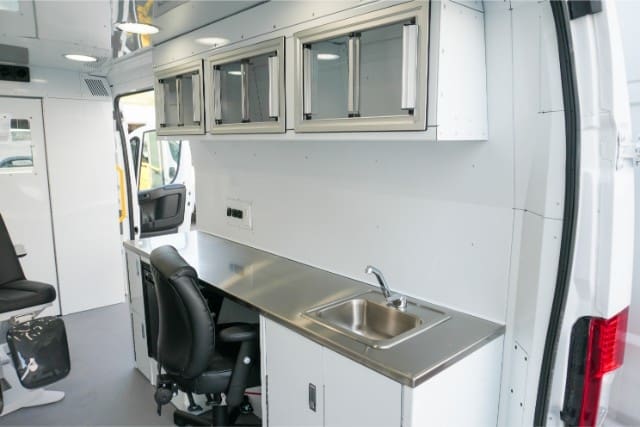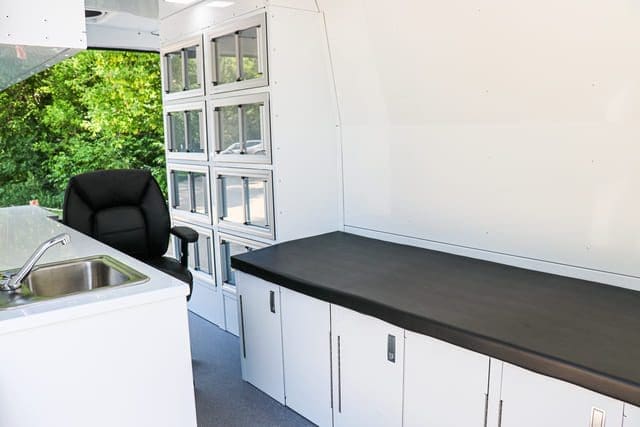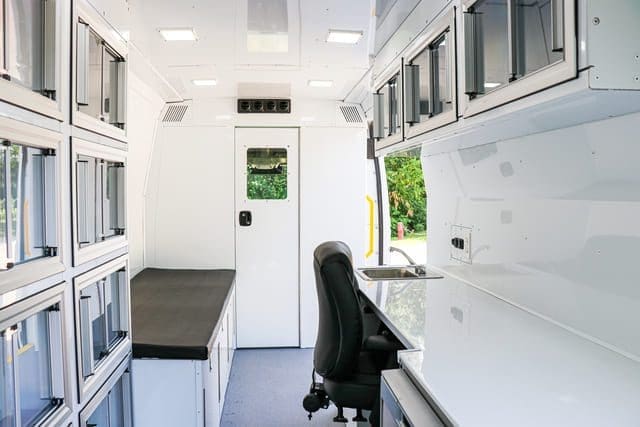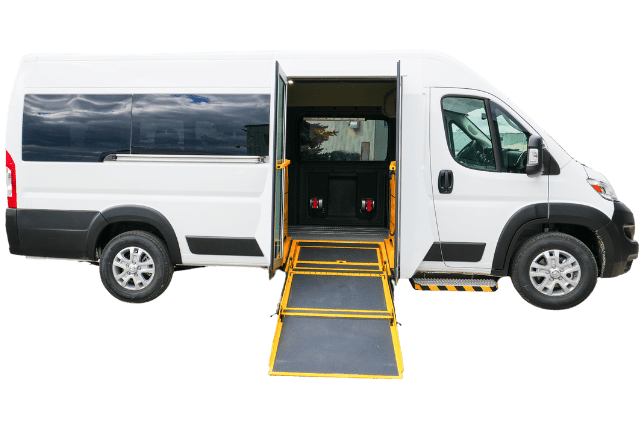When Alberta clinics face service disruptions, people wait longer for care. You might lead a health program in Edmonton, Calgary, or a smaller place like Peace River. When transit stops, roads close, or staff shortages hit, appointments disappear fast. You feel the weight of that. You worry that missing one visit today turns into a hospital trip tomorrow. It can feel like you are fighting barriers instead of helping patients.
Many Alberta clinics are dealing with this reality. Rural communities are hit hardest with long travel times and fewer backup options. People still need mental health care, chronic disease support, and basic checkups, even when a building closes. You want to keep care going. You want people to feel seen and supported. But without a backup plan, disruptions can spread stress across your whole team.
Mobile clinics offer a different path. They bring care to familiar places like school parking lots, community centres, and First Nations health hubs. Your team stays close to the people who count on you.
At MoveMobility, we help programs like yours reach more people. We have over two decades of experience, and our mobile healthcare clinics meet strict safety standards, including the National Safety Mark, Ford QVM, and Stellantis QPro certifications. We listen first because every Alberta community is unique. And while we know there are other options, we are here to help you choose what is truly right for your program.
In this article, you will learn:
- Why disruptions happen
- How mobile health clinics support you during downtime
- Where mobile healthcare clinics make the most difference
- What to think about before taking the next step
8 reasons why Alberta clinics face healthcare service disruptions
Alberta clinics can face service disruptions for reasons that are often outside your control. You show up every day ready to help people, yet a single problem in the system can create long delays for care. When those delays pile up, patients lose trust and teams feel drained. Understanding why disruptions happen helps you build a better plan, so your community keeps getting support.
Below are some of the most common reasons service disruptions hit Alberta clinics.
1. Staff shortages
Finding enough healthcare workers across Alberta keeps getting harder. Recruitment and retention make daily operations feel uncertain in places like Fort McMurray or Medicine Hat. When just one nurse or therapist is away, entire programs may pause. It leaves you feeling like every schedule depends on luck, not planning.
2. Extreme weather
Alberta weather likes to test everyone’s patience. A snowstorm or icy road can shut down travel in an instant. Smoke from wildfires can make it unsafe for patients with asthma or COPD to leave home. Communities in northern Alberta can feel cut off when highways close. Care gets delayed for as long as the weather decides.
3. Facility shutdowns
A building issue always shows up at the worst time. Heating failures, broken elevators, or flooding can stop Alberta clinics from seeing patients. Even short closures can create long waitlists. You want to get back up and running, but repairs take how long they take.
4. Technology issues
Healthcare depends on good connectivity. If the internet drops or electronic medical records go offline, your day can fall apart fast. Some rural and remote Alberta communities still face weak signals or unreliable network access. Without technology working, it becomes tough to check records, book follow-ups, or track care properly.
5. Transportation barriers
Even when Alberta clinics are fully open, many people still face long and expensive travel. Seniors in High River or young families in Taber may need rides they do not have. When buses stop running or winter roads become dangerous, your no-show list grows. That causes more gaps and more pressure on your team.
6. Population shifts
Some Alberta communities are growing fast. Areas like Airdrie, Cochrane, and Leduc are seeing more people move in. When demand climbs faster than clinic capacity, access shrinks. Patients end up waiting longer or skipping help because appointments take too long to get.
7. Care deserts
In parts of Alberta, there simply are not enough healthcare locations nearby. People in remote First Nations communities or farming regions across the province face long travel to reach the nearest available clinic. If anything interrupts service, even briefly, the impact on access can be massive.
8. Operational delays
Sometimes it is neither the building nor the weather. It could be supply delays, late lab results, or administrative backlogs that force you to reschedule care. These disruptions are small at first, but they stack up into burnout and frustration.
Here is what these challenges have in common:
- Patients lose access
- Your team feels overwhelmed
- Health outcomes slide backward
- Trust becomes harder to maintain
Alberta clinics want to give people reliable access to care. Yet the list of things that can get in the way feels longer each year. You are expected to keep serving, even when disruptions threaten to slow everything down.
Next, we’ll talk about ways that Alberta clinics can keep showing up for their communities when challenges strike without warning.
How do mobile clinics help Alberta clinics like yours keep care going during disruptions?
When Alberta clinics face delays, closures, or unsafe travel conditions, mobile clinics give you a way to keep care moving. They don’t replace your clinic. They support it by offering you a backup plan that is flexible and ready when your main plan hits a wall. Mobile health clinics help your team reach people faster and with less stress.
Here is how mobile healthcare clinics help fill those gaps that keep showing up.
Care goes to the community
Mobile clinics drive to the places where people already are. You can set up near a library in Red Deer, a school in Lethbridge, or a band office in Maskwacis. You cut out the travel barrier and meet people in comfortable, familiar spaces. That one shift reduces missed appointments and keeps your schedule full.
Weather disruptions have less power
Extreme weather is hard on Alberta clinics. When slippery roads and smoky air make travel risky, care often stops. Mobile clinics allow you to choose safer routes and locations. You can still reach patients within their own neighborhood, even if a larger health centre must close for the day.
No building. No problem
A burst pipe or broken HVAC can shut down a clinic fast. A mobile unit gives you privacy, clean space, and clinical equipment, no matter what is happening at your facility. Your services keep going without pressing pause for repairs.
Technology challenges have backup options
Alberta’s more remote areas often deal with unstable internet. Mobile healthcare clinics can be equipped with portable and reliable internet service, such as Starlink. When Wi-Fi in a building drops, your mobile team can keep checking records and booking follow-ups in real time.
Faster response to demand spikes
Growing communities feel the pressure of long wait times. Places like Cochrane or Beaumont have more new families every year. A mobile clinic lets you test new outreach areas before deciding if you need a long-term location there. You see how many people show up. You learn what support they ask for most.
People without transportation stay connected
Seniors, youth, and low-income families often depend on buses or rides that fall through. Instead of them missing care, the care comes closer to them. You protect the patient relationship and support better health outcomes.
Consider this example
Picture a community in northern Alberta. The local primary care clinic will be closed for a week due to a heating issue during a cold snap. Temperatures drop. Roads are icy. Travelling far is not safe for seniors or parents with young kids.
Without a backup plan, everyone waits until the building reopens. Care stalls.
With a mobile clinic, your team can park at the community hall. You can offer:
- Quick checkups: For people with diabetes or high blood pressure
- Mental health support: For those feeling isolated during weather events
- Prescription renewals: So small issues do not grow into emergencies
- Wound care: For patients who cannot delay follow-ups
People get seen. Your staff feels useful. The trust stays strong. That one week no longer harms the health of the entire community.
How does this protect your mission?
When disruptions hit Alberta clinics, they also affect families. A missed appointment is more than a blank spot on a calendar. It can lead to:
- Health problems that worsen
- Avoidable hospital visits
- Lost confidence in care
- Burnout for your team
Mobile health clinics give you a chance to protect your mission. You can keep promises even when buildings or roads fail. That is powerful for everyone involved.
Mobile clinics give you a way to say yes more often. Yes to care that keeps going. Yes to outreach without excuses, and yes to making life easier for the people who depend on you.
As a healthcare leader, you want control over how care happens in your community. A mobile clinic gives you that control during the unpredictable days.
What should you think about before taking the next step?

Mobile clinics offer Alberta clinics a powerful way to keep care going during service disruptions. Still, this is a big decision. You want to be confident about how it fits your community, your team, and your long-term goals. Taking a little time to think through what matters most now will help you feel certain later.
Here are a few key things to consider.
1. Your community’s needs
Who struggles most when Alberta clinics pause care? Maybe it is seniors in Airdrie or families in Drumheller. Maybe it is farm workers outside Medicine Hat who miss every appointment because of long drives. Think through the group you want to reach first. When you know who needs help, planning the rest becomes easier.
2. Your service priorities
Mobile healthcare clinics can do many things. They can support mental health visits, chronic disease checkups, vaccination programs, or addiction care. Choosing the top one or two services helps you decide:
- What layout makes sense inside
- Which staff will use the unit
- Where you’ll go first
Start small. Grow when ready.
3. Where you will operate
Some Alberta communities have great places to park and set up. Community centres, school yards, band offices, and recreation halls all work well. Think about where people feel safe showing up. When people feel comfortable, they are more likely to walk in and get support.
5. Who will staff the clinic?
Your team already works hard. A mobile clinic should help lighten the load instead of adding more stress. Planning staffing early keeps things smooth later. Maybe you rotate schedules or add a part-time clinician to support outreach days.
6. How you currently handle disruptions
Look back at the moments that caused the most frustration. Was it weather, staffing gaps, or building closures? Understanding the pain points helps you shape a mobile clinic plan that truly makes life easier for your team.
7. Community partnerships
Working with other local groups can help you reach more people. Leaders from Indigenous communities, libraries, shelters, youth programs, or seniors organizations may want to help host stop locations. You have support around you.
8. Budget planning
This step is important. A mobile clinic is an investment in access. It helps protect people from losing care. Many Alberta organizations build a budget using grants, donors, and fundraising. Thinking through funding early lets you launch sooner with less stress.
Here is a simple way to frame your decision:
| Question | Why it matters |
| Who needs faster access to care? | Shows where impact happens first |
| What services help most right now? | Guides your design choices |
| How fast is your community growing? | Helps prepare for tomorrow |
| What disruptions keep causing stress? | Identifies the biggest gap to fix |
| Who can support outreach stops? | Builds community trust |
Every Alberta clinic is unique. What matters most is that your mobile clinic helps you strengthen care in a way that feels right for your community.
You are already doing so much good. Taking this next step can help you reach even more people with the care they deserve.
Want to keep healthcare moving for your Alberta clinic?

You came here because you’ve likely seen Alberta clinics face disruptions that leave people missing out on healthcare. You want a way to keep healthcare going even when things change fast. That matters because every delay affects someone’s health and well-being.
Here is what you learned:
- Why disruptions happen: Staffing, weather, travel, and more
- How mobile clinics help: They keep outreach strong and care close
- What to consider next: Your services, your community, and your goals
MoveMobility has been helping leaders like you for over 20 years. Hospitals, First Nations health teams, and non-profits across Canada trust our mobile healthcare clinics to protect access to care when life gets unpredictable. We design our units with safety and dignity in mind so your team can focus on the people who need support. We care about the same mission you do. If you have questions, click the button below to talk to a friendly mobility expert who is ready to help.
If you’re not ready to talk yet, here are a few helpful next steps to learn more:
- 5 steps to buying a mobile medical van: A clear next step if you want to move from thinking about a mobile clinic to actually planning one.
- Top 5 ways that mobile medical vehicles inspire proactive health: Helps you see the long-term community impact mobile care can have beyond solving disruptions.





